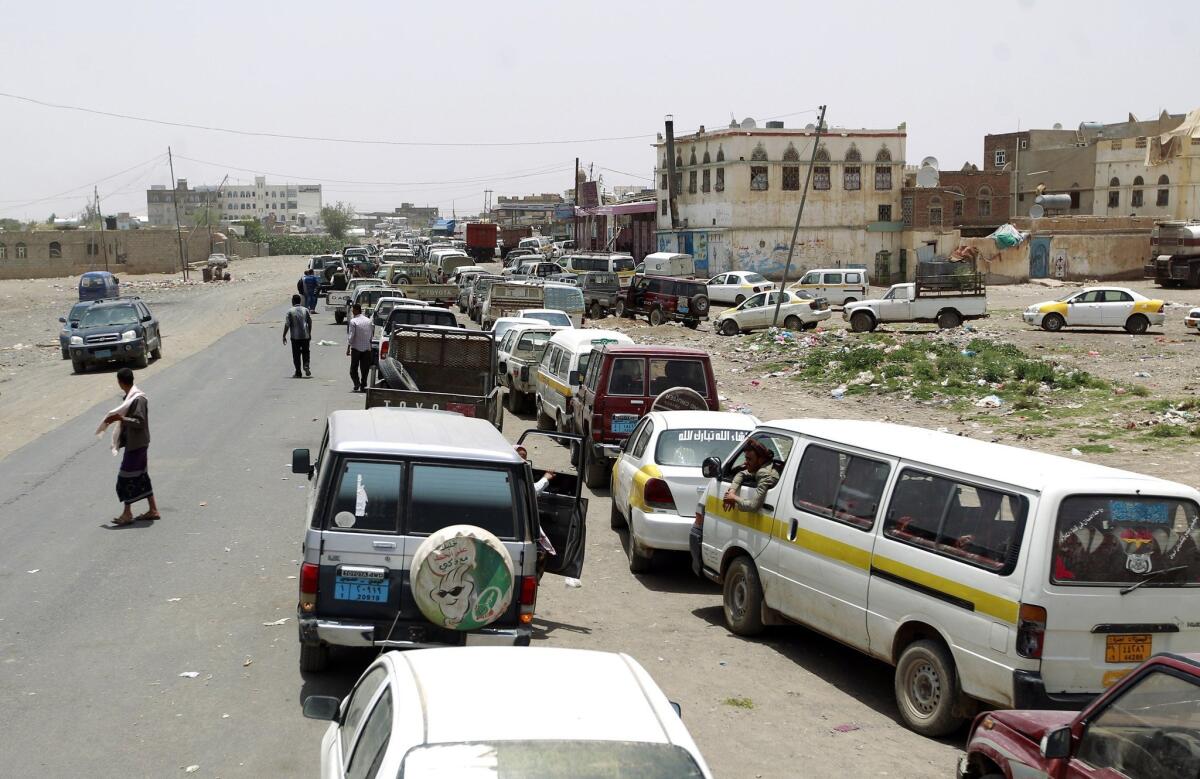Saudi-led airstrikes target rebels a day after Yemen truce ends

Yemeni drivers line up for fuel on May 18 amid an acute shortage in the capital, Sana.
- Share via
Reporting from Sana, Yemen — Fierce new fighting across Yemen and a wave of Saudi-led airstrikes on Monday appeared to bode ill for calls to restart a humanitarian truce that expired a day earlier.
Aid agencies warned that the five-day hiatus had not allowed in nearly enough food, fuel and other supplies to meet the needs of the battered country’s 25 million people.
Reflecting the fear and frustration brought on by nearly two months of bombardment, protesters flooded the streets of the capital, Sana, shouting denunciations of Saudi Arabia and the United States, which has provided logistical support to the Saudi-led coalition confronting Yemen’s Shiite Muslim Houthi rebels.
The cease-fire expired at 11 p.m. local time Sunday, and officials and witnesses said airstrikes resumed shortly thereafter in the port city of Aden, continuing into the early-morning hours. Riyadh Yassin, foreign minister with the Yemeni government in exile, was quoted in news reports as blaming Houthis for violating the truce and prompting the resumption of the offensive.
Residents and officials said apparent targets in Aden were Houthi positions, including the presidential palace. Other strikes hit northern Saada province, heavily damaging the provincial capital’s old city. Antiaircraft fire rattled Sana but no new bombardment was reported in the city.
Pleas from the United Nations and humanitarian groups for an extension of the cease-fire have so far gone unheeded, but Yassin told the Reuters news agency that the renewed strikes would avoid the airport in Sana and the country’s main seaports so that aid shipments could arrive by air and sea.
However, there was no immediate indication that any large-scale deliveries would proceed, as Houthis and forces loyal to exiled President Abdu Rabu Mansour Hadi fought one another in locales including the crossroads city of Taiz, between Sana and Aden, and the southern city of Dhale.
After nearly two months of a blockade intended to keep out armaments for the rebels, Yemenis are in desperate need of food, fuel, drinkable water and medical supplies, humanitarian groups have reported. Aden, the onetime commercial center, has been the hardest hit by urban battles and bombardment, but other major cities and towns have been devastated as well.
The United Nations reported over the weekend that more than 1,800 people, many of them civilians, have been killed in the fighting, and Yemenis describe a daily struggle for survival. Hundreds of thousands of people have been displaced, many of the ill and injured are unable to obtain medical care, and angry quarrels break out over scant supplies of gasoline, sometimes erupting into fatal firefights.
The Houthis launched an offensive last year, overrunning Sana and seizing large tracts of territory. The Saudi-led coalition began its air offensive on March 26 after Hadi, who had taken shelter in Aden, was forced to flee by sea in the face of an advance by the Houthis and their allies.
The fighting in Yemen has aggravated sectarian tensions between Saudi Arabia, the region’s main Sunni Muslim power, and Shiite Iran, which backs the Houthis. The insurgents boycotted three days of talks in Saudi Arabia, and Iran on Monday echoed Houthi denunciations of using the Saudi capital, Riyadh, as a venue for any dialogue.
An advisor to Iran’s supreme leader, Ayatollah Ali Khamenei, was quoted by the Associated Press as saying Yemen talks should be held in a “neutral” location under the auspices of an international mediator. Ali Akbar Velayati’s remarks came during a visit to Beirut, the news agency said.
Special correspondent Al-Alayaa reported from Sana and Times staff writer King from Cairo. Special correspondent Amro Hassan in Berlin contributed to this report.
Follow @laurakingLAT on Twitter for news out of the Middle East
More to Read
Sign up for Essential California
The most important California stories and recommendations in your inbox every morning.
You may occasionally receive promotional content from the Los Angeles Times.













